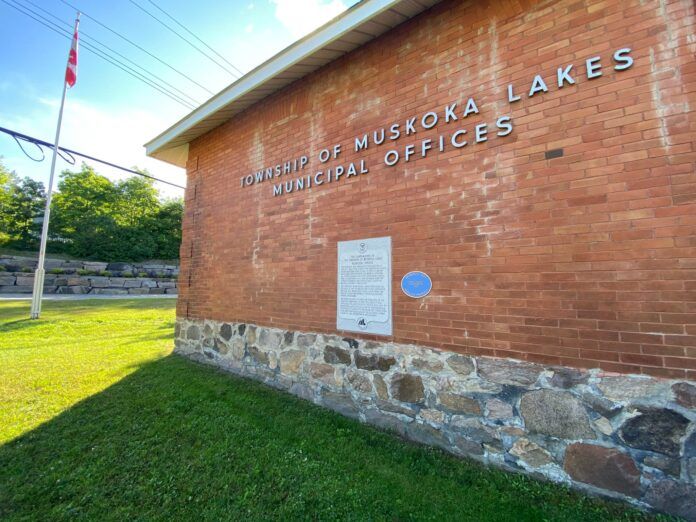Muskoka Algonquin Healthcare (MAHC) addressed Muskoka Lakes council Wednesday morning as District of Muskoka council prepares to rethink its $77.3 million local share commitment during its next meeting.
The money is pooled together with commitments from MAHC, the respective Huntsville and South Muskoka Hospital Foundations, respective Towns of Bracebridge, Huntsville, and Gravenhurst, and the 10 municipalities that make up Almaguin Highlands.
The $225 local share represents part of the $1 billion budget for MAHC’s hospital redevelopment project, with the remaining money coming from the Ministry of Health.
Muskoka Lakes’ Mayor Peter Kelley shared how he and District Coun. Guy Burry put forward a motion asking for the district’s local share commitment, “be made conditional on the final design plan being approved by District of Muskoka council prior to MAHC submitting its final design to the province.”
Kelley said the model has “drastically been altered” since the district agreed to the commitment in late 2023.
Kelley and Burry’s motion will be debated during the July 15 district council meeting.
He shared that after an hour-long discussion between Muskoka Lakes council and Dave Uffelmann, board chair for MAHC, and Cheryl Harrison, president and chief executive officer for MAHC. The pair spoke during the July 10 General/Finance Committee meeting to address some of the concerns they’ve heard about the “Made-in-Muskoka healthcare system” proposal.
“The proposed model was informed by comprehensive data and decades of healthcare experience,” said Harrison.
She added they have listened to physicians, including looking into the “Care Close to Home” model they presented earlier this year. However, Harrison said the plan was costed by MAHC and it came out around $700 million over budget.
Harrison also addressed the disparity in beds between the Huntsville District Memorial Hospital and South Muskoka Memorial Hospital in Bracebridge with 121 and 36 allocated to each, respectively. She explained how the Huntsville facility needs more beds since it will be for longer-term stays.
She gave the example of a day at the hospital in Bracebridge from June 2024 when 73 beds were occupied. She said 26 were patients needing an alternative level of care and another 26 would need to stay longer than six days. Harrison explained with the proposed model, those 52 patients would be in Huntsville while the remaining 21, who needed to stay in hospital between zero and six days, would remain in Bracebridge.
Harrison said the regional model means the two hospitals need the other since services won’t be duplicated.
She shared how they estimate there will be an extra one or two transfers a day – or 470 a year – between the two hospitals with the proposed model. However, Harrison said 95 percent of patients will not need to be transferred from the hospitals in Bracebridge or Huntsville. She pointed out transfers will only happen when a patient is in stable condition, which allows them to reschedule the move, if needed.
MAHC’s Board of Directors agreed to allow the consultants to begin more in-depth work on the plan, but not without controversy.
Coun. Glenn Zavitz asked about the statements from Parry Sound-Muskoka MPP Graydon Smith and Bracebridge’s Mayor Rick Maloney, who wrote MAHC has lost the trust of some residents, specifically in South Muskoka, prior to the decision being made.
“You seemed to ignore it,” he alleged.
Uffelmann said the community misunderstood what the motion in question entailed. It just allows the consultants to continue planning.
“Originally we wanted to submit to the provincial government around now,” he continued. “We put it on hold for almost six months in order to continue with engagement and get more input.”
Now, Uffelmann said, this puts them on track to submit the plan in the fall, but not before continued consultation.
“We need concrete suggestions not just ‘it’s not acceptable’ or ‘we need more beds’,” he continued. “This is all based on data.”
Uffelmann said MAHC doesn’t need to hear just what has to change, but why it should and how it’s going to be done.
“It seems almost suicidal to be on this trajectory where we’re upsetting 50 people who we’re going to have a horrible time replacing,” countered Zavitz, speaking on the concerns from local physicians.
Harrison shared MAHC is hosting meetings with groups of four to five doctors is the coming weeks.
“Nobody has been told they can’t speak,” added Harrison.
She said throughout the process there have been discussions involving sensitive information. Harrison added physicians were asked to ensure they have their facts straight before speaking publicly.
“There was a request, as there should be, around confidentially that was never intended to make people feel like they were being gagged,” said Harrison.





